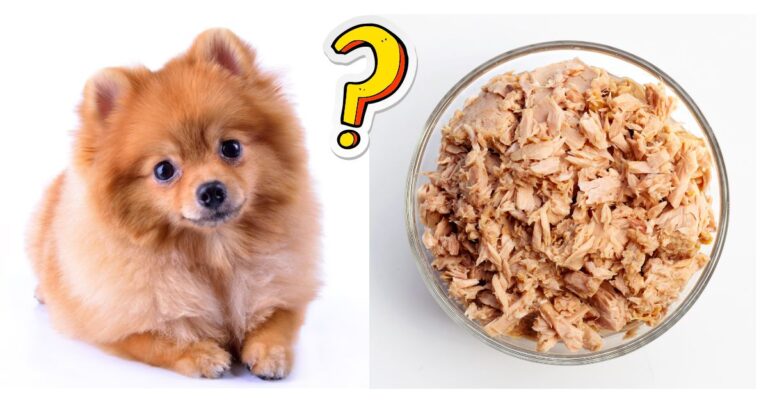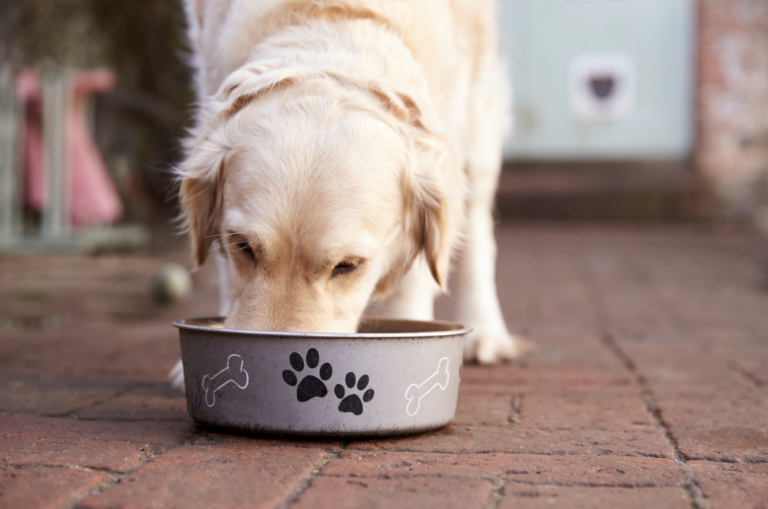Can Dogs Eat Tuna? Why Dog Owners Should Be Cautious
We won’t make you wait for the answer to your question. Can dogs eat tuna? Yes, but in serious moderation and with some conditions. Like most varieties of fish, tuna is safe for dogs to eat, but you want to limit it to small amounts and only certain types and preparations.
In this guide, we’ll cover all of the ins and outs of feeding your dog tuna, important limits to set to prevent your dog from developing health problems, and tips for finding healthier ways to add fish and omega-3 fatty acids to your dog’s diet.

Is Tuna Safe For Dogs?
Dog experts like the AKC don’t recommend feeding dogs tuna because of its high mercury content. Tuna is a large saltwater (ocean) fish, and takes years to reach full maturity. Tuna spend more time in the ocean and have more exposure to mercury than other species of fish.
It’s also important to note that different varieties of tuna contain different amounts of mercury. If you only occasionally feed tuna to your dog and stick to the varieties of tuna that are lower in mercury, the risk of causing health problems is low. However, regularly feeding tuna to your dog (or cat) could lead to mercury poisoning, particularly if you are feeding them kinds of tuna that are known to be high in mercury.
Take a quick look at this chart using data from the Environmental Defense Fund. While all varieties of tuna contain mercury, those with elevated levels are worse than the varieties with moderate levels.
| Tuna Variety | Source | Fresh or Canned | Mercury Level |
| Albacore (White Tuna) | U.S. & Canada | Fresh | Moderate |
| Albacore (White Tuna) | Imported | Fresh | Elevated |
| Albacore (White Tuna) | N/A | Canned | Elevated |
| Bluefin | N/A | Fresh | Elevated |
| Skipjack (Light Tuna) | N/A | Canned | Moderate |
The most common types of tuna you’ll likely come across in your grocery store are two varieties of canned tuna: Albacore (or white tuna) and Skipjack (or light tuna). If you have a choice, light tuna is better since the Skipjack is a smaller species of tuna and contains less mercury.
Signs of Mercury Poisoning in Dogs

While tuna is not toxic to dogs, feeding it to your dog regularly does pose a risk of mercury poisoning. Though relatively rare, mercury poisoning in dogs is serious, can cause long-term health concerns, and may be fatal if left untreated. If your dog has been eating tuna regularly and you are concerned about their mercury intake, keep an eye out for these symptoms of mercury poisoning:
- Hair loss
- Unusual anxiety or nervousness
- Vision loss or blindness
- Not urinating (sign of kidney damage)
- Abdominal swelling (sign of kidney damage)
- Stumbling, trouble walking, or loss of coordination
- Shaking, trembling, or tremors
- Watery or bloody diarrhea or vomit
Can Dogs Eat Tuna Fish? Benefits & Nutritional Value
We know that dogs can very occasionally have a small amount of tuna now and then, but is this rare treat good for dogs at all?

Tuna is high in omega-3 fatty acids, which are highly beneficial for dogs. However, you can’t feed your dog enough tuna safely for them to benefit from its nutritional value. There are much safer ways to add omega-3s to your dog’s diet, ones that won’t put your dog at risk of mercury poisoning.
Tuna Alternatives: Kinds of Fish That Are Good For Dogs
Tuna poses a much larger risk to your dog’s health than other types of fish. If you want to include seafood in your dog’s diet, these other kinds of fish are always recommended over tuna and are readily available in commercial dog food.
- Salmon
- Whitefish
- Arctic Char
- Herring
- Walleye
If your main goal is to add omega-3 fatty acids to your dog’s diet, you can also add a fish oil or omega oil supplement to their food.
Can Dogs Eat Tuna? FAQ

Learn more about feeding your dog tuna, protecting their health, and making good choices for their diet with answers to the most common questions on dogs and tuna fish.
Can dogs eat canned tuna in water?
Can dogs eat tuna in water, or should you choose a different kind of canned tuna? Short answer: Yes, dogs can eat canned tuna in water in extreme moderation. If you feed tuna to your dog, it should always be unseasoned and free from added oil, so canned tuna packed in water without salt is the best canned option.
Can dogs eat canned tuna in oil?
No! The oil used to pack tuna is too fatty for your dog and will cause an upset stomach.
Can dogs eat raw tuna?
No. Although when live fish are caught they are usually flash-frozen as quickly as possible, raw fish can still harbor bacteria that could make your dog sick. Tuna should not be a regular treat or part of your dog’s diet, but if your dog does occasionally get tuna, it must be cooked tuna.
Can dogs eat tuna salad?
No. Tuna salad contains lots of mayonnaise, salt, and extra seasoning, and is not safe to feed to your dog.
Can dogs eat albacore tuna?
Yes, in extreme moderation. Keep in mind that albacore tuna is higher in mercury than smaller varieties of tuna like skipjack.
How often can dogs eat canned tuna?
You should ideally not feed tuna to your dog, but if you do choose to give them tuna occasionally, limit it to around a tablespoon for big dogs or a teaspoon for small dogs no more than once every 1-2 weeks. The best thing you can do is to choose a different variety of fish to feed your dog.
What kinds of canned fish are safe for dogs?
Canned sardines and canned salmon in water with no added salt are both great options to add to your dog’s diet for extra omega-3 fatty acids and protein!
Related Posts:
- Can Dogs Eat Popcorn? The Do’s and Don’ts of Sharing This Snack with Dogs
- Can Dogs Eat Eggplant? Yes! Here’s How To Get Your Dog To Eat It
- Can Dogs Eat Sauerkraut? Is This Side Dish Safe or Suspect?




